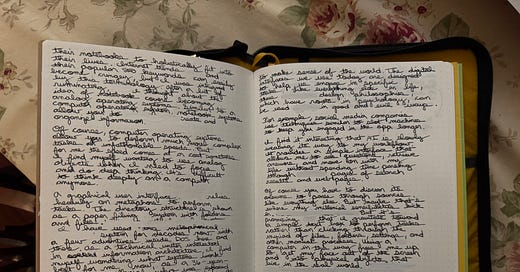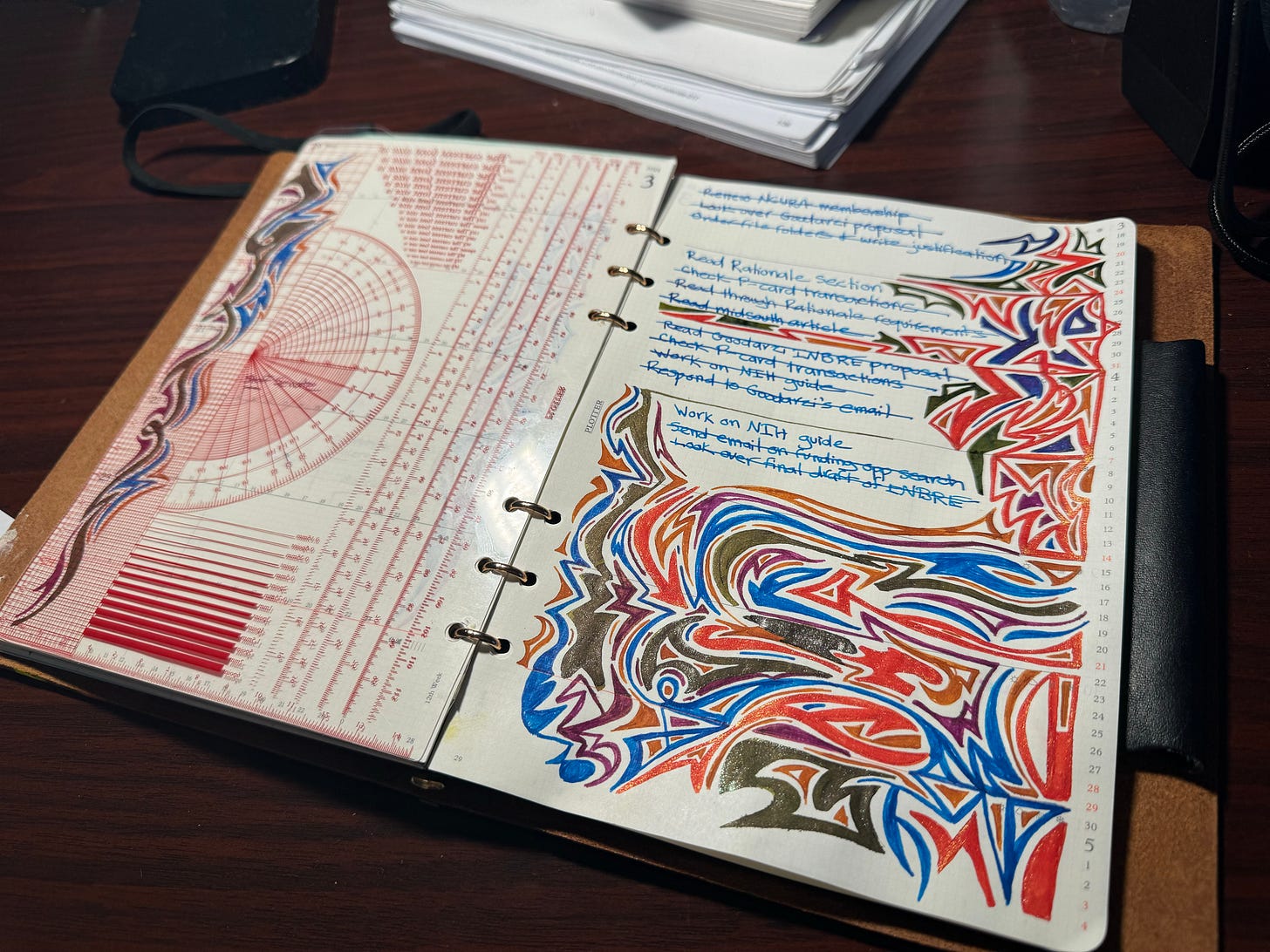No matter how entrenched I become in my digital workflow, I will always need to include analog tools in my life. Right now, I’m drafting this article in my new Lochby B5 folio. I love the act of physically compartmentalizing my workflow and experimenting with analog structures that reflect what’s important to me and what I want to learn.
My original intent for this article was to focus on notebook covers, but as I progressed, I felt a new theme emerge: I love tinkering with organization systems, both analog and digital. I’m a technical writer, so I nerd out at discovering processes, procedures, tools, user contexts, and information flow.
At first I thought this idea may just be a way for me to justify my notebook obsession. But I think there’s more to this picture. I organize my life in both analog and digital means. I am continually trying to tinker with my digital workflows and systems to make my life more efficient, creative, and focused. But I can never go all-in because it becomes a sea of distractions and wasted time. We’re hitting an attention and focus crisis point in our society, and I am trying to navigate these rough waters as much as anyone else. In 2025, I find myself wanting to balance my use of both analog and digital organization systems.
The Analog Operating System
I don’t think I’m the only person asking how to maintain balance from this digital rat race we find ourselves in. Many companies now are creating notebook cover systems for people like me who still need to organize their thoughts with pen and paper. I’ve been experimenting with these systems, trying to push the boundaries of creatively using notebooks for planning, brainstorming, praying, pontificating, and drawing. A new trend on the internet is emerging, called the “notebook ecosystem,” where people show how their notebooks holistically fit into their lives. Internet trends and their popular SEO keywords can become cringey at times, but I was intrigued by this terminology. In my article on how I used my Plotter notebook as a spiritual everyday carry item, I discuss how this notebook system enhances my spiritual life and prepares me for my monthly spiritual direction meetings. I want to continue focuses on this topic and see where my experiments take me.
After a bit of ruminating, I thought about the idea of notebook covers becoming analog operating systems. Similar to a computer operating system, notebook systems allow you to create and organize data and information.
Of course, computer operating systems perform much more complex tasks at fast speeds. But for me, the speed can be detrimental at times. I find myself using analog objects when I need to focus and do deep thinking. The process, and how I go about it is just as important as the final result. If I’m not careful, I can easily find myself going from start to finish without focusing on the process, or filling the process time with distractions.
The Digital Operating System: From text to Pictures to Text Again
The front-facing element of the operating system is the user interface, which relies heavily upon metaphors to help users perform tasks. The directory structure, once directed by the user in a text-based command-line interface, now uses a metaphorical paper filing system with folders and files. And now mobile operating systems are becoming even more rudimentary, where you rarely even interact with a directory or filing system. Everything you need are in contained in apps.
I have used this metaphorical graphic system for decades now, with a few adventures inside DOS here and there. As a technical writer interested in information architecture and how people interact with systems, I find myself wondering what systems work best for me now, as a 36-year-old millennial who was exposed to paper, books, handwriting, command-line interfaces, Windows 95, Mac OS, iOS, and film cameras.
This poses an interesting question for my workflow: Lately I find myself gravitating toward text-based interfaces again, and use the physical object itself rather than its digital metaphor. I don’t want a complex GUI. I want the computer to be the computer and the paper to be paper. That may be from the mental overhead of the amount of graphics I see and interact with on a daily basis. I’m tired of seeing thousands of images a day. I’m tired of deciphering what’s in the callout box. I’m tired of parsing through thousands of results to find what I’m looking for.
And I think this is where AI is slowing weaving its way into my workflow. It provides a simple interface that allows me to ask questions, retrieve answers, and move on to another part of the process without spending time parsing through pages of search results and web pages. Of course you have to discern its answers to parse through sources, like everything else in research. But the ability to use a simple text-based interface makes me think that we’re moving away from complex graphical interfaces and toward the simple command-line interfaces of before. Using a computer in this way frees me up to get my face out of the screen and into the physical world and interact with its objects.
Investigating Why
So this is where I am right now in my life. I spend too much time on social media and the mental overhead of my digital use is making me tired. So I retreat to my notebooks and stationery, where I enjoy the slow process of physically using tools to enhance my life, perform tasks, and just be human. In this process, I’m discovering the use of AI in helping me with my digital workflow. I also find myself gravitating toward smaller online social groups for more meaningful discourse. I want to ask myself how to maintain balance in this complicated world that is not slowing down.
I want to take the next several weeks to investigate my analog and digital workflows and discover how I can better tailor these systems to live a life that God has called me to live.
Throughout this process, I want to focus on a few specific questions:
What do I want to accomplish?
What principles are important in my life?
How does the medium I use affect this process?
Stay tuned for more. In my next post, I’ll focus on a specific notebook system I’m using.









There's lots of facility now for using apps to conduct a prayer life and even participate in Mass. But of course it's never the same as thumbing through pages of a Bible, holding a missal in the pew, or handling an actual rosary.
Paper bulletins I can happily do without though--those just collect like junk mail, lol.
Nietzsche was fascinated with writing on a typewriter. He felt he thought differently when composing on a typewriter, which was new technology at the time.